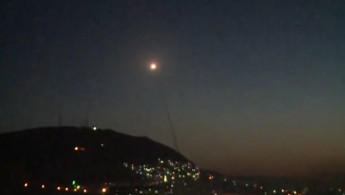US, France, Britain launch airstrikes on Syria
As Trump embarked on a White House address to announce the action - taken in defiance of Russia's threat to respond - explosions were heard in the Syrian capital Damascus, signalling a new chapter in a brutal seven-year-old civil war.
Several consecutive blasts were heard at 4:00 am (0100 GMT), followed by the sound of airplanes overhead, AFP's correspondent in the city said. Smoke could be seen rising from the northern and eastern edges of the capital.
"A short time ago, I ordered the United States armed forces to launch precision strikes on targets associated with the chemical weapons capabilities of Syrian dictator Bashar al-Assad," Trump said, in a primetime address.
"A combined operation with the armed forces of France and the United Kingdom is now under way. We thank them both," Trump added.
"This massacre was a significant escalation in a pattern of chemical weapons use by that very terrible regime," he said of the suspected deadly gas attack a week ago on the rebel-held Damascus suburb of Douma.
"The evil and the despicable attack left mother and fathers, infants and children thrashing in pain and gasping for air. These are not the actions of a man. They are crimes of a monster instead."
 |
The evil and the despicable attack left mother and fathers, infants and children thrashing in pain and gasping for air. These are not the actions of a man. They are crimes of a monster instead. - US President Donald Trump |
 |
'Heavy strike'
General Joseph Dunford, Washington's top general, said the precision strikes hit three targets - a scientific research center near Damascus, a storage facility and command post also near the capital and a chemical weapons storage facility near Homs.
He added that Syrian surface to air missile batteries had attempted to fire back, but there were no initial reports of any allied losses.
It was a marked escalation in force compared to a US strike launched a year ago, when only cruise missiles were used against a single airfield.
Dunford said Russia's forces in Syria had been warned through existing "deconfliction" channels that western planes would be in Syrian air space, but that Washington had not revealed the target sites or timing in advance.
Defense Secretary Jim Mattis said no additional strikes were planned unless Assad again uses chemical weapons.
"We were very precise and proportionate, but at the same time, it was a heavy strike," he said.
 |
We cannot tolerate the normalization of the use of chemical weapons - France's President Emmanuel Macron |
 |
United front
Trump also warned Russia and Iran not to stand by their ally in Damascus.
"Russia must decide if it will continue down this dark path or if it will join with civilized nations as a force for stability and peace," he argued.
The strikes had been expected since harrowing footage surfaced of the aftermath of the attack in Douma, which prompted a furious reaction from Trump.
Trump's anger and apparent determination was quickly matched by France's President Emmanuel Macron, who signed his country up for a joint response.
"We cannot tolerate the normalization of the use of chemical weapons," Macron said in a statement.
Britain's Prime Minister Theresa May was more cautious, but by the time the first precision cruise missile was launched, Trump had a mini-coalition.
"We cannot allow the use of chemical weapons to become normalized – within Syria, on the streets of the UK, or anywhere else in our world," May said, referring to a recent assassination attempt on a Russian double agent.





 Follow the Middle East's top stories in English at The New Arab on Google News
Follow the Middle East's top stories in English at The New Arab on Google News


![22 Arab countries at COP29 have rejected the targeting of fossil fuels [Getty]](/sites/default/files/styles/image_330x185/public/2024-11/GettyImages-2184289638.jpg?h=199d8c1f&itok=ptHl5bec)